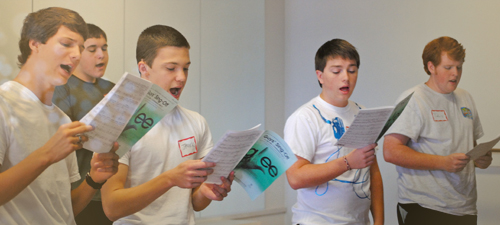
Finding a good voice teacher is not an easy task–especially if you live outside a major city. You may find a handful of piano teachers, a couple good guitar teachers, and even a drum instructor or two, but you’re lucky if you find a single (qualified) voice teacher.
Questions You Should Ask a Voice Teacher
Here is a list of questions you might want to ask of a potential voice teacher:
- What is your professional singing experience?
- What is your teaching experience?
- Did you study how to teach? Where?
- What kind of musical styles do you teach?
- What can I expect in a typical lesson?
- What kind of practice should I expect?
- How often will I have lessons?
- What other training is available (group classes, workshops, seminars, instrument training, music theory, or other)?
- Who are some of your other students?
Questions a Voice Teacher Should Ask You
Of course, you shouldn’t be the only one asking questions. A good teacher wants to make sure both you and they are a good match. Just as you’re checking out the teacher, the teacher should be evaluating your background, your previous training, your ambition, and just about you personally. You should look for a teacher who asks you questions, such as:
- Why are you looking for a voice teacher?
- What do you hope to accomplish?
- What style of music interest you?
- What previous training or singing experience have you had?
- Do you read music or play an instrument such as piano or guitar?
- When you connect with a teacher who asks sincere questions, you know he or she wants to make voice lessons a successful experience for you both.
Other Important Information for Choosing a Voice Teacher
- You need to get the feel of a teacher before you commit to long-term training. Talk with other students about their experience and see what they have to say. Ask for a trial lesson before you commit; there’s nothing like first-hand experience to help you both decide if you are a good fit.
- Listen to the teachers other students. If they all sound like clones, think twice about pursuing lessons with that teacher. Good technique is good technique, but every individual voice has its own unique qualities. A good teacher will help you develop your personal sound within the context of solid singing technique. Don’t settle for a cookie cutter approach. Look for a teacher who can work with your own individual talents and desires.
- Never study with a teacher who is chronically hoarse or has a voice that is unpleasant to you. Trust your ears and your gut. If it’s obvious they can’t sing, go somewhere else.
- You should also avoid a teacher who sings more during a lesson than you do. The lesson time is for you, not them!
Do you have a voice teacher? — How did you find him or her?
Are you a voice teacher? — What advice would you give to potential students who want to take lessons?
Add your thoughts and comments here!


My goal as a voice teacher/breath coach is to help others to clarify and identify where they presently stand at this point in the artistic journey, so that they can consider charting a course to get from where they are to where they desire to be someday. After all, you cannot make flight reservations if you don’t know what airport you will be departing from.
Progress is a constant, rate is the variable, so reminding the voice student of the value of skillful independent study is vital.
And lastly, don’t quit your day dream.
KingKirby.net
Training the Total Artist
King Kirby – Thank you for visiting ILoveToSing.com. I have long loved your posts on Facebook. You are a gifted singer and consummate artists because you recognize the source of those gifts. God bless you as you continue to impart your knowledge with young, and young-at-heart, singers!
Thanks for contributing your voice in your comments here at ILoveToSing.com!
Don’t forget to sign up for my newsletter at http://www.ilovetosing.com/about/subscribe/. Thanks!
~Jonathan